-
Researchers use app to map spread of infectious diseases
Researchers in the United Kingdom are using cell phones to map how infectious diseases are spread to help tailor public health policies during a mass outbreak; researchers developed a special app, called FluPhone, for mobile phones that gathered medical data from the user as well as information on how they interacted with other people; the app provides a scientific method for measuring the social activity of an entire population in real-time; FluPhone app can also be used to run simulations on how a disease would actually spread
-
-
Asthma cases rising, researchers do not know why

Despite efforts in the United States to improve air quality, recent research shows that asthma rates are on the rise, leaving public health officials baffled; on Tuesday, the U.S. Centers for Disease Control and Prevention (CDC) announced that from 2001 to 2009 an additional 4.3 million people had been diagnosed with asthma; in 2001, 7.3 percent of the United States suffered from asthma, but in 2009 that number grew to 8.2 percent; black children saw the largest increase in asthma rates, growing nearly 50 percent over the last decade
-
-
Social media helps CDC track Playboy Mansion disease outbreak

Thanks to social media outlets, medical researchers are one step closer to discovering why more than 120 people were infected with a mysterious illness following a 3 February party at the Playboy Mansion; investigators suspect that the bacteria that causes Legionnaires’ disease may have been the source of the outbreak after its presence was discovered in the grotto of the Playboy Mansion; officials used online tools like Twitter, Facebook, and online polling to help track the disease outbreak; these tools were particularly helpful because they allowed officials to quickly identify the outbreak, communicate quickly with conference goers who came from thirty countries, and to issue instructions for the infected
-
-
California schools struggle to vaccinate millions against whooping cough
After experiencing its worst whooping cough outbreak in more than six decades, California is taking extra precautions to ensure that children are vaccinated against the preventable disease; California lawmakers mandated that all children entering the seventh grade and up must have a whooping cough booster vaccine; but parents and school districts are still scrambling to get children vaccinated before the Fall when students will be prohibited from entering a classroom without it; nearly three million students must be vaccinated making it a logistical nightmare for schools to process paperwork; in 2010, there were than 7,800 cases of whooping cough and the disease claimed the lives of ten children
-
-
Information sharing seen as public health "game changer"
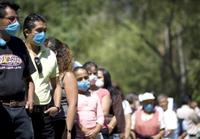
Public health officials are pushing for the creation of shared databases that contain electronic health records (EHRs) to help combat infectious diseases and stop epidemics; a CDC official pointed to the positive impact that electronic health information exchanges (HIE) have on public health; during the 2003 SARS outbreak, Milwaukee helped establish a four-state network that automatically detected new cases of SARS based on electronic reports from local hospital emergency rooms; manual reporting of test results is a slow process, but with the use of electronic reporting public health officials can now quickly identify epidemics and pandemics as they occur
-
-
Nine die in Alabama from infected IVs
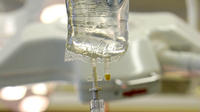
Alabama public health officials are currently investigating the deaths of nine patients who received intravenous nutrition from contaminated feedbags; officials say that the intravenous nutrition solution, called total parenteral nutrition (TPN), contained Serratia marcescens bacteremia, which leads to a bacterial infection in the blood; investigators have traced the source of the contaminated intravenous nutrition feed bags to the pharmaceutical supplier Meds IV; the bacteria is commonly found and it is difficult to specifically link the organisms that killed the nine patients to those found at Meds IV facility
-
-
Information about Maryland biolabs scarce
High-level containment laboratories and storage facilities that handle dangerous biological agents exist in Frederick County, Maryland, outside the secured gates of Fort Detrick, but state law mandates that the number and location of each remains confidential; supporters of the current system say that confidentiality is critical to maintain the security and safety of the labs, but critics argue that the secrecy makes it impossible for emergency services in the neighborhood to prepare properly for accidents
-
-
Full-body scanners not a health risk
A new study concludes that there is “no significant threat” from backscatter X-ray scanners; even though they use ionizing radiation, which is known to cause cancer, the doses are so low — less than 1 percent of the additional radiation a person gets from flying in an airplane in the first place, and about the same received through 3 to 9 minutes of daily life on the ground — that only a handful of cancer cases are likely to result directly from scanner use
-
-
Canada launches TB website to stem spread of disease
Researchers at Canada’s McGill University recently launched a free website to help doctors around the world stem the spread of tuberculosis (TB); the website offers detailed information on TB vaccinations in over 180 countries; while TB levels are at all-time lows in Canada and the United States, TB has grown increasingly prevalent around the world particularly in Africa and India; in India, there are nearly two million new cases of TB each year and it is the leading cause of death among people between the ages of fifteen and forty-five; the International Federation of Red Cross and Red Crescent Studies recently warned that up to ten million people could die of TB by 2015; if detected early, TB can be treated with antibiotics
-
-
The health effects of airport security scanners
The Transportation Security Administration (TSA) has begun to use whole-body imaging scanners as a primary screening measure on travelers passing through airport security checkpoints; one type of scanner employs millimeter wave technology, which delivers no ionizing radiation; the second type of scanner currently deployed at airports, however, uses backscatter X-rays that expose the individual being screened to very low levels of ionizing radiation; what are the health implications of these scanners? Two prominent radiologists offer answers
-
-
Stemming the spread of disease at airports
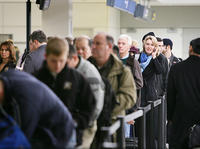
With roughly two million people flying each day and spending hours in confined areas where they will come into close contact with potentially infected people, air travel poses a serious challenge to public health officials seeking to contain major disease outbreaks; last month public health officials scrambled to contain a potential mass outbreak of measles after a woman flew through three U.S airports, coming into contact with thousands of people; a CDC report recommends using infrared thermal scanners to detect passengers with fevers as that is an easily recognizable symptom and it is a common indicator of most infectious diseases
-
-
Official: U.S. safe from Japanese radiation
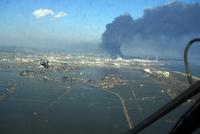
U.S nuclear officials said that there was very little chance that harmful levels of radiation from Japan’s nuclear reactors would reach Hawaii or the west coast of the United States; the head of the Nuclear Regulatory Commission (NRC) also said nuclear plants in the United States were designed to withstand natural disasters like earthquakes and tsunamis; readings from radiation sensors placed on the west coast have not detected any increases in radiation levels and experts do not expect any increases; Japanese utilities have flooded two nuclear reactors with sea water in a desperate attempt to cool them down and prevent a meltdown; the NRC has dispatched two nuclear experts to Japan to assist with efforts to keep three damaged reactors from melting down
-
-
Future of U.S. nuclear plans uncertain after Japanese nuclear crisis

As Japan continues its struggle to control its nuclear reactors, the future of the U.S. nuclear industry has become increasingly uncertain; nuclear power had emerged as the bipartisan solution to easing America’s dependency on oil; in February 2010, President Obama announced $8.3 billion in loan guarantees to energy companies to build the first new nuclear power plants in the United States in almost thirty years; some lawmakers have called for a moratorium and stricter safety regulations, while others are urging for a more measured response; Energy Secretary Stephen Chu and Gregory B. Jaczko, the chairman of the Nuclear Regulatory Commission, will testify before the House Energy and Commerce committee on Wednesday
-
-
Radioactive waste contaminates drinking water, EPA does nothing
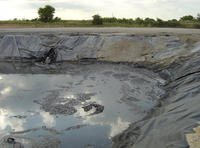
Recent Environmental Protection Agency (EPA) documents show that Pennsylvania’s drinking water has been contaminated with radioactive waste from natural gas drilling; energy companies have been extracting natural gas with a new drilling technique called “hydrofracking”; this process results in millions of gallons of wastewater that is contaminated with dangerous chemicals like highly corrosive salts, carcinogens, and radioactive elements; EPA documents reveal the process has been contaminating drinking water supplies across the country with radioactive waste; in Pennsylvania more than 1.3 billion gallons of radioactive wastewater was trucked to plants that could not process out the toxins before it released the water into drinking supplies
-
-
Medical isotopes could be made without a nuclear reactor
Canadian researchers are racing to perfect a safe, clean, inexpensive, and reliable method for making isotopes used in medical-imaging and diagnostic procedures — a method which would not require a nuclear reactor and could, therefore, eliminate future shortages of technetium-99m, the most widely used medical isotope today; what is more, the new method generates virtually no radioactive waste materials that must be stored indefinitely
-
More headlines
The long view
We Ran the C.D.C.: Kennedy Is Endangering Every American’s Health
Nine former leaders of the Centers for Disease Control and Prevention (CDC), who served as directors or acting directors under Republican and Democratic administrations, serving under presidents from Jimmy Carter to Donald Trrump, argue that HHS Secretary Roert F. Kennedy Jr. poses a clear and present danger to the health of Americans. He has placed anti-vaxxers and conspiracy theorists at top HHS positions, and he appears to be guided by a hostility to science and a belief in bizarre, unscientific approaches to public health.
